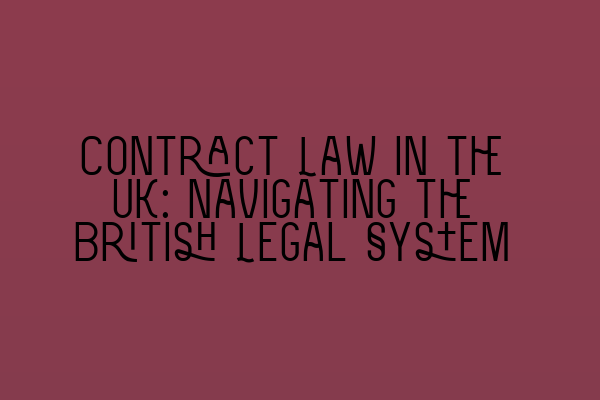Contract Law in the UK: Navigating the British Legal System
Contract law is a fundamental aspect of the British legal system, governing the formation, interpretation, and enforcement of agreements between parties. Understanding the intricacies of contract law is crucial for individuals and businesses alike, as it provides the necessary framework to protect rights and ensure that agreements are lawful and binding.
In this blog post, we will explore key concepts of contract law in the UK, providing you with a comprehensive guide to navigating the British legal system. Whether you are a law student, solicitor, or simply interested in understanding contract law, this article is designed to provide valuable insights.
Formation of Contracts
Contracts can be formed through various means, including written agreements, verbal agreements, and even conduct between the parties involved. However, for a contract to be legally enforceable, certain requirements must be met. These requirements typically include:
- Offer and Acceptance: An offer made by one party and accepted by another party, demonstrating mutual agreement.
- Consideration: Something of value, such as money or goods, exchanged between the parties as part of the agreement.
- Intention to Create Legal Relations: Both parties must intend for the agreement to be legally binding.
- Capacity: The parties involved must have the legal capacity to enter into a contract.
It is important to note that certain contracts, such as those involving the sale of land or the guarantee of another’s debt, must be in writing to be enforceable. This requirement falls under the Statute of Frauds, which aims to prevent fraud and ensure the validity of important agreements.
Terms of the Contract
Once a contract is formed, its terms define the rights and obligations of the parties involved. Terms can be expressed, meaning explicitly stated in the agreement, or implied, meaning they are understood to be part of the contract based on the circumstances.
Express terms are considered the most important and are usually specifically negotiated and agreed upon by the parties. These terms can include price, timeframes, delivery dates, and any specific requirements or conditions unique to the agreement.
Implied terms, on the other hand, are not explicitly stated but are still considered part of the contract. These terms can derive from common law, statute law, or previous dealings between the parties. Implied terms are important as they help to regulate the agreement and fill in any gaps or uncertainties not covered by express terms.
Breach of Contract
When one party fails to fulfill their obligations under a contract, it is considered a breach of contract. Breach can occur in various ways, such as non-payment, late delivery, or failure to meet quality standards. The innocent party, who suffers as a result of the breach, may have a right to seek remedies and compensation.
Remedies for breach of contract can include:
- Damages: Financial compensation awarded to the innocent party to compensate for any losses incurred.
- Specific Performance: An order from the court requiring the breaching party to fulfill their obligations as outlined in the contract.
- Rescission: The termination of the contract, with both parties being returned to their original positions before the agreement was made.
- Injunction: A court order prohibiting the breaching party from certain actions or requiring them to take specific actions.
Other Considerations in Contract Law
While the above concepts provide a solid foundation for understanding contract law, there are numerous other considerations that may arise in specific circumstances. For example, contracts may be subject to various restrictions and regulations, such as those related to consumer protection, unfair terms, and competition law.
Additionally, it is important to understand the impact of various legal doctrines, such as mistake, misrepresentation, duress, and undue influence, as they can affect the validity and enforceability of a contract.
Conclusion
Contract law is a complex and important aspect of the British legal system. Whether you are entering into a contract personally or professionally, having a solid understanding of the legal principles can help protect your rights and ensure successful outcomes.
By familiarizing yourself with the formation of contracts, terms and conditions, breach and remedies, and other considerations, you are better equipped to navigate the complexities of contract law and make informed decisions.
If you are preparing for the SQE exam or looking for SQE preparation courses, visit our related articles for more information:
